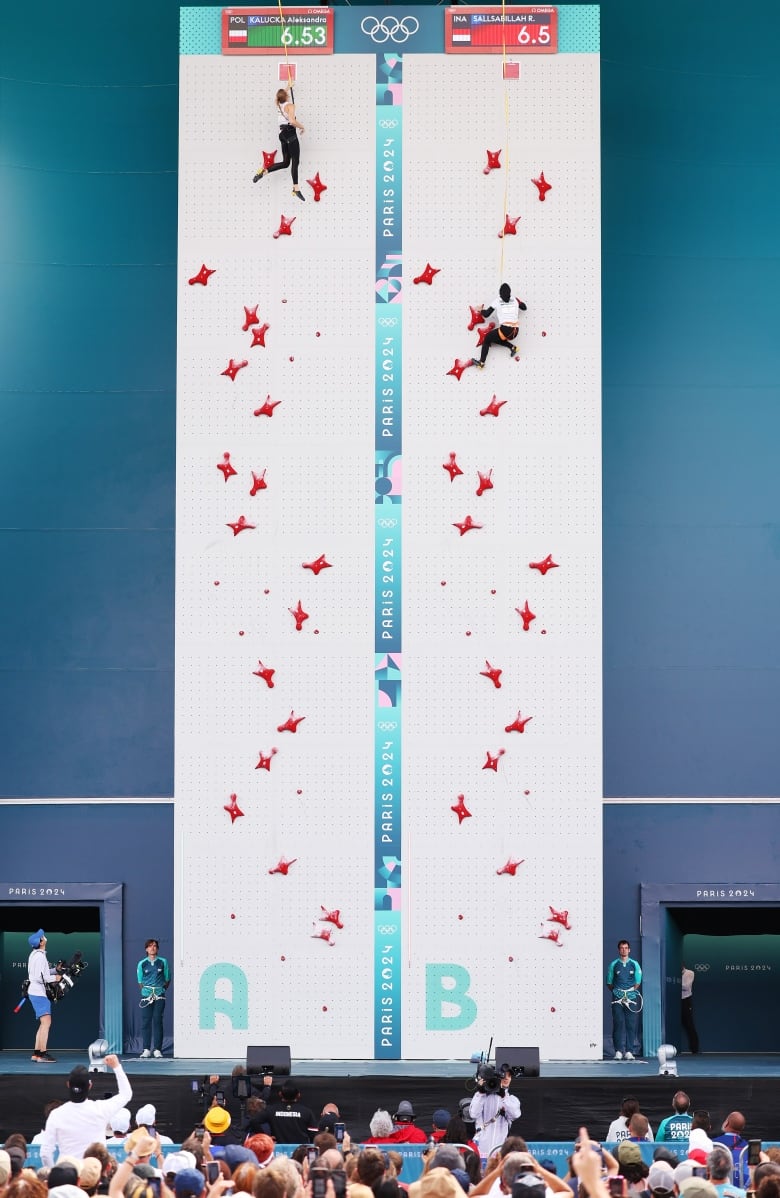Polish speed climber Aleksandra Miroslaw breaks her world record twice en route to gold

Aleksandra Miroslaw won Poland’s first gold medal in Paris on Wednesday in the women’s speed climbing, having already broken her own world record twice at the 2024 Olympics.
At the Le Bourget venue, she climbed a 15-metre wall in 6.10 seconds, beating China’s Deng Lijuan in a photo finish. The silver medallist set her personal best in the race, with 6.18 seconds.
“It means a lot,” Miroslaw said. “It’s the first time for speed climbing and … I have my flag, and I was standing on the podium in the first-place [position], hearing the national anthem. It was amazing.”
Her compatriot Aleksandra Kalucka won the bronze medal with a time of 6.53 seconds.
Miroslaw set the previous record of 6.24 seconds last year. She bettered it with a 6.21 before quickly smashing her record again with a 6.06, all in one day, during qualifying heats on Aug. 5.
Sport climbing is making its second Olympic appearance, but the Paris Games are the first where the speed discipline is a separate medal event from boulder and lead, as is the norm for the sport, due to the vastly different techniques required.
The smallest misstep can seal the fate of athletes in the Olympics’ fastest race, as it did for American Emma Hunt. In arguably the day’s biggest upset, Hunt was eliminated in the quarter-finals after her right foot slipped halfway up the wall. The 21-year-old had been the favourite to challenge Miroslaw for the gold.
Hometown mural may need updating
A recently unveiled mural in Miroslaw’s hometown will now need to be updated after her Olympics performances.
The life-sized mural features figures of Miroslaw in successive phases of climbing to the height of 15 metres, along with her old world record time and previous medal wins, and was ready in time for the Paris Olympics.
“The inspiration was Aleksandra herself, a girl from my city, Lublin. A petite girl who can run up a 15-metre wall in just over six seconds,” said artist Michal Cwiek. He chose to depict her in a 1:1 scale to “show people in a tangible way the scale of difficulty of what this girl is doing.”

“From the start I hoped that after a successful performance at the Olympics I would need to correct the time shown on the mural, and change the information about her achievements.”
Luckily, Cwiek didn’t set about changing it immediately after Miroslaw broke her record in the qualifying heats on Monday as she quickly bettered it with a 6.06. He now hopes the athlete can help out when she returns home with her gold medal.
“I dream of persuading Aleksandra to spray paint a stencil with her new world record on the wall herself.”
Bronze winner shares medal with twin
After hitting the buzzer that turned green to confirm her third-place win over Indonesia’s Rajiah Sallsabillah, Aleksandra Kalucka lowered herself along the belay and looked for her biggest cheerleader in the audience — her twin sister Natalia, who missed out on the Paris Olympics after Kalucka took Poland’s final spot in the event.
“I certainly wouldn’t be here without her and this is our common medal, so we did it together,” Aleksandra Kalucka, known as Ola, said after winning bronze.
“She is the most important person in my life,” Ola said. “So [of course] after the competition I caught my sister to talk about my feelings. We are so close and I’m so grateful that my sister helps me so much. Without her I wouldn’t be here.”

It could have easily been Natalia in action. She was the 2021 world champion and had taken the World Cup title from her sister last year.
The Kalucka twins have been competing together on the international climbing circuit for years, but only one of them could make it to Paris because Miroslaw had taken the other available spot in Poland’s team.
The sisters had cried at breakfast on the June morning when they raced each other in the final Olympics qualification round in Budapest that would decide which would become a Paris Olympian.

There was no hint of envy, however, from Natalia who appeared on camera with Ola after the race, performing a mock interview for TV as a joke.
“How did you manage to do it without a great person such as myself?” she laughed.
When Ola responded by reminding her that she had just beaten her sister’s personal best time — not once, but twice — at the Olympics, Natalia feigned a scarred ego and scolded her sibling for rubbing it in.
“You didn’t have to add that,” she said. “But I’m a proud sister. I’m not the star at the moment.”




